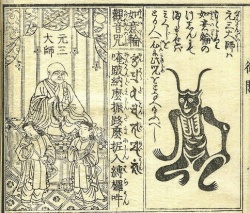Ryogen
Ryogen
[良源] (912–985)
Also known as the Great Teacher Jie. The eighteenth chief priest of Enryaku-ji, the head temple of the Tendai school on Mount Hiei in Japan. He is regarded as a restorer of the Tendai school. A native of Omi Province, he began his Buddhist practice at Mount Hiei in 923. In 937 he defeated the priest Gishoof the Dharma Characteristics (Hosso) school in debate, and in 963 he prevailed over the priest Hozoof the same school in what became known as the Owa Debate, held at the imperial court. (It is called the Owa Debate because it took place in the third year of the Owa era, 963). Thus he won nationwide fame. In 966 he became chief priest of Enryaku-ji temple, and in 981 was appointed general administrator of priests, the highest rank in the priesthood. He was often ordered by the imperial court to conduct a prayer ritual for the security of the imperial family. He also rebuilt dilapidated temples on Mount Hiei and helped restore the Tendai school. His major disciples Genshin and Kakuun founded the Eshin branch and the Danna branch, respectively, of the Tendai school.
......
Ryōgen (良源?, 912 – January 31, 985 AD) was a chief abbot of Enryaku-Temple (Enryaku-ji) in the 10th century, and the founder of the tradition of warrior monks (sōhei).
Over the course of the 10th century, there had been a number of disputes between Enryaku-ji and the other temples and shrines of the Kyōto area, many of which were resolved by force. In 970, Ryōgen formed a small army to defend Enryaku-Temple and to serve its interests in these disputes. Records are not fully clear on whether this army consisted of hired mercenaries, or, as would be the case later, trained monks. Most likely, this first temple standing army was a mercenary group, separate from the monks, since Ryōgen forbade monks from carrying weapons.
In addition to the prohibition on carrying weapons, Ryōgen's monks were subject to a list of 26 articles released by Ryōgen in 970; they were forbidden from covering their faces, inflicting corporal punishment, violently interrupting prayer services, or leaving Mount Hiei during their 12-year training.
